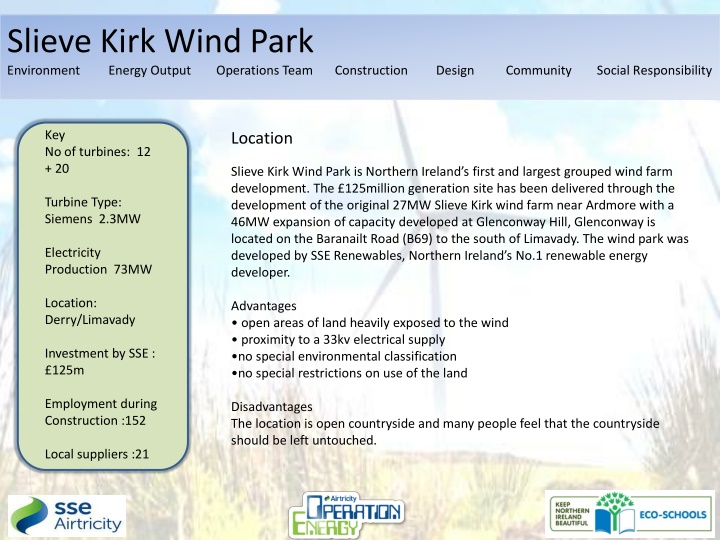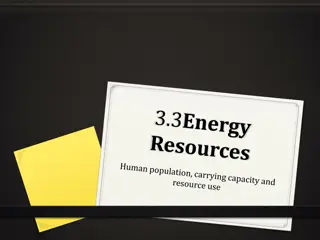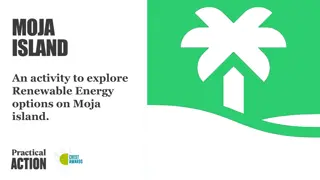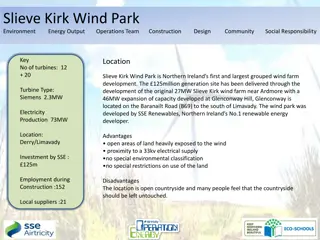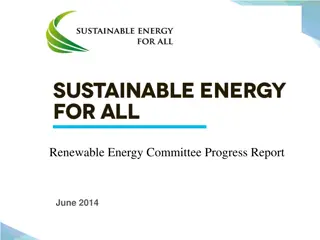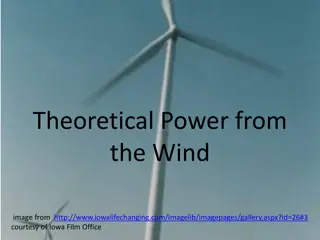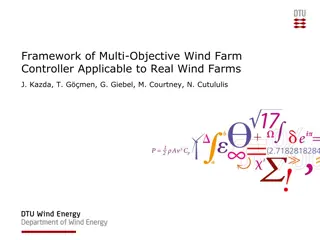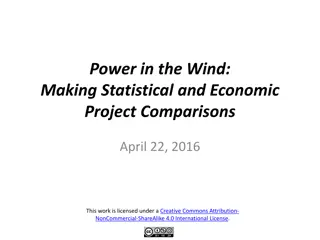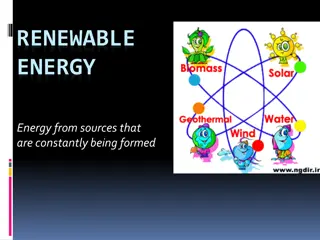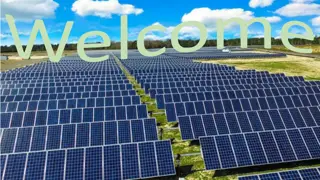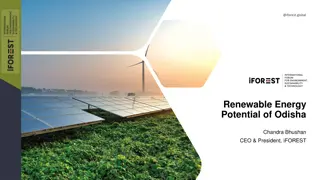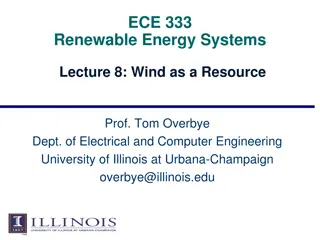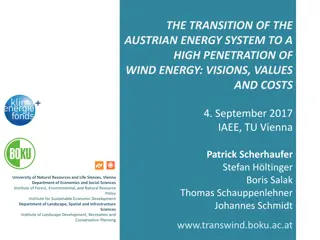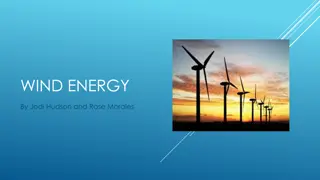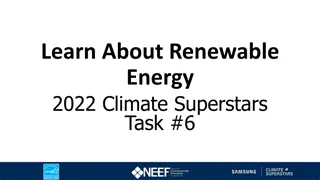Slieve Kirk Wind Park: Leading Renewable Energy Development in Northern Ireland
Slieve Kirk Wind Park in Northern Ireland is a significant renewable energy project developed by SSE Renewables. With a capacity of 73MW and 12+20 Siemens 2.3MW turbines, it generates around 200GWh annually, powering over 65,000 homes. The park focuses on community engagement, social responsibility, and sustainable energy production, contributing to a greener future.
Download Presentation

Please find below an Image/Link to download the presentation.
The content on the website is provided AS IS for your information and personal use only. It may not be sold, licensed, or shared on other websites without obtaining consent from the author.If you encounter any issues during the download, it is possible that the publisher has removed the file from their server.
You are allowed to download the files provided on this website for personal or commercial use, subject to the condition that they are used lawfully. All files are the property of their respective owners.
The content on the website is provided AS IS for your information and personal use only. It may not be sold, licensed, or shared on other websites without obtaining consent from the author.
E N D
Presentation Transcript
Slieve Kirk Wind Park Environment Energy Output Operations Team Construction Design Community Social Responsibility Key No of turbines: 12 + 20 Location Slieve Kirk Wind Park is Northern Ireland s first and largest grouped wind farm development. The 125million generation site has been delivered through the development of the original 27MW Slieve Kirk wind farm near Ardmore with a 46MW expansion of capacity developed at Glenconway Hill, Glenconway is located on the Baranailt Road (B69) to the south of Limavady. The wind park was developed by SSE Renewables, Northern Ireland s No.1 renewable energy developer. Turbine Type: Siemens 2.3MW Electricity Production 73MW Location: Derry/Limavady Advantages open areas of land heavily exposed to the wind proximity to a 33kv electrical supply no special environmental classification no special restrictions on use of the land Investment by SSE : 125m Employment during Construction :152 Disadvantages The location is open countryside and many people feel that the countryside should be left untouched. Local suppliers :21
Slieve Kirk Wind Park Energy Output Energy Output Advantages Slieve Kirk Wind Park is expected to generate around 200GWh of electricity each year, producing enough green energy to power over 65,000 Northern Ireland homes. The green energy generated at Slieve Kirk powers Airtricity, Northern Ireland s second largest energy provider. Key No of turbines: 12 + 20 Turbine Type: Siemens 2.3MW Electricity Production 73MW A project of this sort will generate income for up to 25 years. At present, electricity generated by wind power attracts not only a base level electricity price, but also various enhancements due to it being a clean renewable source. (base level electricity price between 14- 19p/kwh) Location : Derry/Limavady Investment by SSE : 125m Disadvantage The amount of electricity produced depends on the strength of the wind, if there is no wind then no electricity is produced . Employment during Construction :152 Local suppliers :21
Slieve Kirk Wind Park Environment Energy Output Operations Team Construction Design Community Social Responsibility Operations Team Here s a video of SSE Ireland s Wind Operations Manager, Ciaran Maguire discussing what it s like to work for SSE: http://www.youtube.com/watch?v=uh3H1YcwmTI If YouTube unavailable use this link http://news.sse.com/listing/2013/07/irish-wind-farm-creates-seven-new- jobs/ Proper Management of operating wind farms is critical to maximising returns from a wind farm investment. Besides day to day management of the wind farm, the Operations Manager will seek to pro-actively extract every possible hour of availability from the turbines. Key No of turbines: 12 + 20 Turbine Type: Siemens 2.3MW Electricity Production 73MW Location : Derry/ Limavady Safety Investment by SSE : 125m Health and safety management is often included in the scope of the Operations Manager. A Health & Safety Management Plan, incorporating risk assessments, method statements and procedures, must be created and maintained for the life of the wind farm. Employment during Construction :152 Local suppliers :21
Slieve Kirk Wind Park Construction Design Construction 8,000m of access tracks (suitable to carry loads up to 140 tonnes up an 18% gradient), 6km of public road upgrade at Slieve Kirk. Key No of turbines: 12 + 20 Design Onshore wind energy Wind turbines produce electricity by harnessing the natural power of the wind to drive a generator. Turbine Type: Siemens 2.3MW Electricity Production 73MW Most commercial-scale wind turbines consist of rotor blades which rotate around a horizontal hub. The hub is connected to a gearbox and generator, these are located inside the nacelle. The nacelle houses the electrical components and is mounted at the top of the tower. Location : Derry/Limavady The first wind farm in the UK was built at Delabole in 1991. Since then, onshore wind energy has established itself as a mature, clean energy- generating technology. Investment by SSE : 125m Employment during Construction :152 Wind energy overtook hydro in 2007 to become the largest renewable generation source, contributing 2.2% of the UK's electricity supply. Onshore wind comprises the bulk of this. Local suppliers :21
Slieve Kirk Wind Park Community Advantage The Community Fund aims to support energy efficiency and sustainability projects in the locality of wind farms. The fund is paid out annually; starting one year after the wind farm starts producing electricity and operates for the lifetime of each site. http://www.sse.com/Ireland/CommunityFund/ http://irelandnews.sse.com/listing/2013/08/slieve-kirk-awards-funding-to-thirteen-community- groups/ Operation Energy is an interactive website for teachers and pupils which offers a variety of energy focused teaching resources, activities and games, all of which support learning across the Northern Ireland curriculum. Teachers can choose from over 60 free classroom activities with 10 energy focused lessons plans for Foundation, KS1 and KS2. For pupils, it has exciting games, home energy pledges and a media gallery. http://www.operation-energy.com/ http://irelandnews.sse.com/listing/2013/10/eco-schools-pupils-help-to-launch-airtricity's- power-down-day/ http://irelandnews.sse.com/listing/2013/10/sustainable-students-visit-airtricity%e2%80%99s- bessy-bell-wind-farm/ Key No of turbines: 12 + 20 Turbine Type: Siemens 2.3MW Electricity Production 73MW Location : Derry/Limavady Investment by SSE : 125m Disadvantage Wind farms produce noise. The Turbines may spoil the view for people living near by them, depending on people s aesthetic sense. Employment during Construction :152 Local suppliers :21
Slieve Kirk Wind Park Social Responsibility Social Issues 73MW Slieve Kirk Wind Park has been built at a total capital investment cost of 125million of which 36million has been spent directly with around 75 local supply chain businesses supporting local jobs and enterprise. Key No of turbines: 12 + 20 Turbine Type: Siemens 2.3MW http://irelandnews.sse.com/listing/2013/11/case-study-slieve-kirk-wind-park- local-economic-benefits/ Electricity Production 73MW http://irelandnews.sse.com/listing/2013/11/video-slieve-kirk-wind-park-'our- local-supply-chain'/ Location : Derry/Limavady Investment by SSE : 125m Employment during Construction :152 Local suppliers :21
Key Questions What is renewable energy? Why has Northern Ireland been chosen as a location for wind farms? What is the significance of renewable energy in Northern Ireland? What does it mean for me? Prior Learning know about sources of renewable and non-renewable energy know about human and physical features, including some of the ways people affect the environment be aware that environmental change can be sustainable be able to use maps to locate places and identify geographical patterns be able to construct maps to convey geographical understanding have developed their Using ICT and Communication skills (if Using ICT and Communication tasks are being used as assessment opportunities)
There are topical articles about renewable energy in Northern Ireland available online. Give each group a range of these and ask them to research wind power in Northern Ireland. You could ask the pupils to find other links that offer reliable information, depending on their skills levels. Challenge each group to speak for 30 seconds, without hesitation or repetition, on why wind power is important for Northern Ireland.
Objectives develop geographical skills to interpret spatial patterns including map work; develop enquiry and fieldwork skills through: -- questioning; -- planning; -- recording; -- analysing; interpreting information; and drawing conclusions relating to a range of secondary sources; develop critical and creative thinking skills to solve geographical problems and make informed decisions; and develop a sense of place through the study of: -- a local context; and -- an issue of topical significance.
Task Explain to the pupils that they are going to examine the location of Slieve Kirk. Invite each group to log onto NI Maps and search for Slieve Kirk. Encourage them to: use the tools in NI maps to measure distance on the map to houses, pylons and major roads; find the grid reference of their chosen site at www.irish.gridreferencefinder.com/; and record the mean wind speed at their selected site. Wind speeds for any post code in NI are available at http://www.actionrenewables.co.uk/resources/windmap/ the Post Code for Slieve Kirk BT47 3RL Give each group the set of cards in Resource 1. Ask them to compare these cards with their suggestions regarding the reasons why Slieve Kirk was chosen as a location. Next, ask each group to sort the cards using the Diamond Rank strategy. This means that they rank the cards with the factors that they think were most important when Slieve Kirk was being considered as a site for a wind farm at the top, with those less important at the bottom (template available in Resource 1). Give each group time to report their results and to compare with others, so that they can discuss and justify their choices and decisions. Allow groups to rearrange the cards if they change their mind. Ask the class to group the cards under the headings Physical Factors and Human Factors About NI Maps NI Maps has been provided by C2k for all schools in Northern Ireland. With direct relevance to Northern Ireland's curriculum, NI Maps provides all teachers and learners in schools with online access to detailed Ordnance Survey Northern Ireland (OSNI) maps and aerial photographs for use in their teaching and learning.
Resource 1 Slieve Kirk is situated outside the Causeway Coast AONB, no special environmental classification. Slieve Kirk s Peak is 370 m above sea level. The turbines are located on the ridge to the East of Slieve kirk. Open areas of land heavily exposed to the wind. Average wind speeds at this site are around 10 metres per second. When the wind speed is approximately 4 m/s the machine rotor will run up to synchronous speed. Construction of Northern Ireland s 1st 110kV Wind farm substation and 1st 110kV contestable overhead line grid connection at Slieve Kirk for SSE Renewables. The Wind farm owner has pledged a further 18.5m towards the economy over the next 25 years through annual commercial rates payments, landowner lease contributions and community funding. Slieve Kirk Wind farm land is bounded by and accessed by Bigwood Road, Kildoag Road and Castlewarren Road, Slieve Kirk Wind Park is expected to generate around 200GWh* of electricity each year, producing enough green energy to power over 65,000 Northern Ireland homes. The green energy generated at Slieve Kirk will significantly decarbonise energy generation in the country, further contributing to Northern Ireland s 40% target of renewable electricity generation by 2020. The project is being delivered on an upland blanket bog, no special restrictions on use of the land.
Commercial Wind Farms Key Issues Energy output which will be dependent on the location and the technology being used, Costs the costs of installing and maintaining the equipment and subsequent connection to the electrical grid system, Environmental issues the impact on the local environment in terms of effect on land use and the natural habitat, Social issues the possible impact on local residents who may object to large wind turbines impacting on the visual nature of the location and possible noise effects. Review the SKWP Case Study and evaluate the decision to locate a Wind Farm by considering the key issues above.
Links http://www.airtricity.com/uk/home/ http://www.operation-energy.com/ http://www.keepnorthernirelandbeautiful.org/ http://www.eco-schoolsni.org/ http://www.iwea.com/_wind_information http://www.renewableuk.com/
